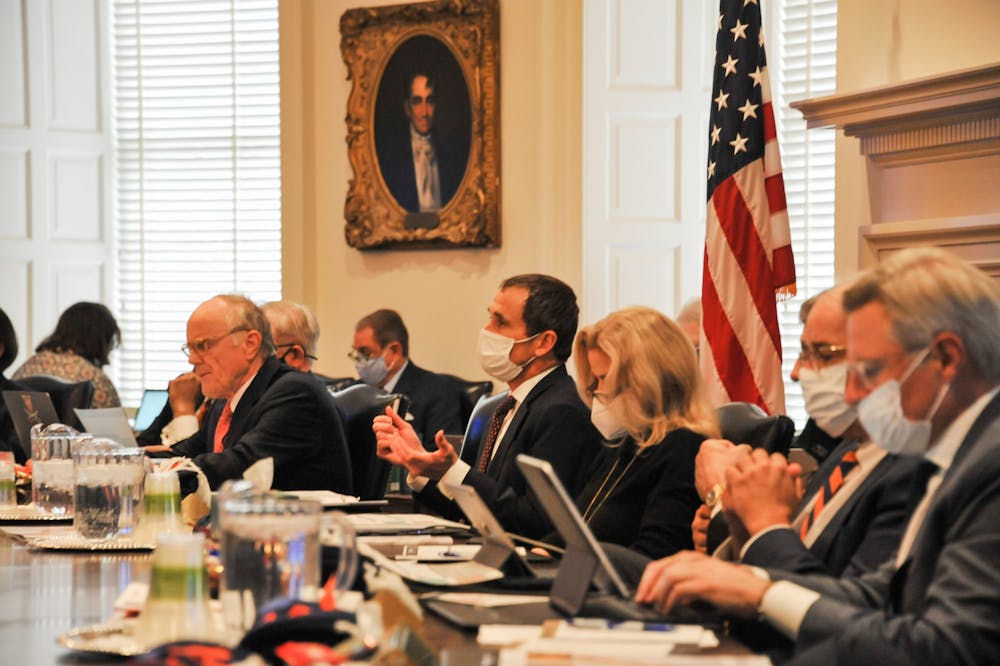The Advancement Committee of the Board of Visitors met Friday morning to discuss fundraising, provide updates on progress towards the Honor the Future campaign and welcome guests to discuss a significant gift.
Vice President for Advancement Mark Luellen began the meeting by giving an overview of the University’s fundraising performance so far this fiscal year, which began July 1. The University finished the first quarter with $121 million in total commitments to the University — a 124 percent increase from the same time last year — and $86 million in philanthropic cash flow, a 63 percent increase from the first quarter last year. Philanthropic cash flow refers to funds that the University receives in cash.
“As we know, last year started off a bit slow as it relates to commitments, so the percentage growth may seem a little bit high,” Luellen said. “However, if you put it in context, $121 million in commitments is the highest first quarter we've had in this campaign, and based upon my research, I think the highest first quarter in the University's history.”
As of Dec. 9, the University is now at $205 million in commitments since the fiscal year began. The University also has an additional $45 million in verbal commitments, where paperwork is currently being reviewed by donors.
This growth has primarily been driven by gifts of $1 million or more throughout the campaign, Luellen said. Of the $205 million that the University has signed in commitments since July 1, $126 million, or 61.4 percent, have come from gifts of $1 million or more.
Including verbal commitments that are still being signed, the University stands at a grand total of $3.83 billion — or 77 percent — against its $5 billion goal in the Honor the Future Campaign with three and a half years remaining in the campaign.
Luellen also talked about the success of the Board’s “regional road show” — members traveled across the region for receptions, where University President Jim Ryan presents an address on the state of the University and addresses questions important to alumni.
“The response to these events has been staggering,” Luellen said. “The unsolicited positive feedback that we have received afterwards from staff and from alums, writing and calling, has been very contagious.”
Since October, Board members have visited Richmond, D.C., New York, Connecticut and Atlanta and plan to travel to Houston, Dallas, Palm Beach, the San Francisco Bay Area and Los Angeles after the new year.
Rob Allen, associate vice president for development, then discussed the success of the University’s Memorandum of Understanding partnership program, which, according to Allen, was the first of its kind and is now starting to be replicated among peer institutions.
The program began when a dean of the Frank Batten School for Leadership & Public Policy came to Luellen to discuss how the University could support fundraising for Batten. Previously, University Advancement was primarily concerned with pan-University priorities rather than delving into the needs of individual schools, but with the new plan, Batten was able to report to the University on fundraising and work closely with deans and faculty. Eight of the 12 schools at the University are now part of the MOU program.
“The advantage of having so many schools as partners is we can leverage the strength of the collective, so there's a lot more conversation, a lot more collaboration,” Allen said.
Following Luellen and Allen’s presentations, Ryan introduced special guests Donna and Richard Tadler, alumni of the University who made a $5 million commitment in October that will be matched by the University to establish the Donna and Richard Tadler University Professorship of Entrepreneurship.
University professorships are established for faculty who are given the distinguished title University Professor. The original idea was that bearers of that title would be able to teach across schools, but University professorships lack independent funding, meaning that the faculty member’s salary only comes from a particular school that may not be as excited to have its professor teach in a different school, Ryan said. To address this, the University made a commitment to create at least ten professorships under the Honor the Future campaign, with this one being the fourth in the last six months.
“I think these professorships … will be transformative for the University, truly,” Ryan said. “Especially once we have ten, we should be able to attract the very best teachers and researchers.”
Richard said that it was this cross-curriculum, cross-school idea that made him and Donna — and perhaps other donors — enthusiastic about making a gift. The couple’s hope is that, with their gift, they will see entrepreneurial studies focus on parts of the Commonwealth that are falling behind, such as rural and suburban Virginia.
“We believe that entrepreneurial efforts are what's going to make that happen, not some giant factory coming in from out of nowhere, but those individual efforts to make those towns work,” Richard said. “This is a long term process to educate, both faculty and students, on how to make the Commonwealth of Virginia better.”







